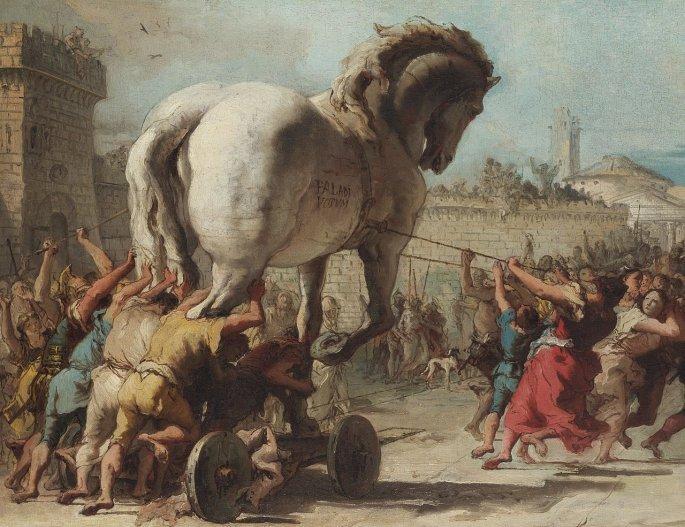Brief history of the Trojan war
The Trojan War lasted 10 years but Homer in his epic Iliad, describes the events of the last year of the war and especially the Wrath of Achilles and the fall of Troy. The Trojan War story is probably a real genealogy of gods, heroes and kings of Greece and Troy. In the centuries that followed the war, the various storytellers in the narratives they made in the courtyards and the banquets of various kings and lords, in order to flatter them, added to the myth “achievements” from the ancestors of these kings and lords.
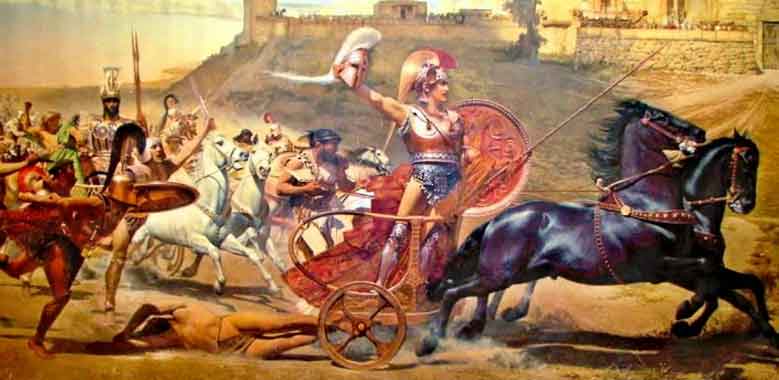
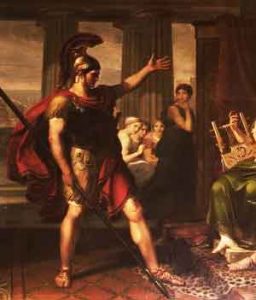
With the support of other Greek kings, Helen’s husband, King Menelaus, and his brother, King Agamemnon of Mycenae, created an armed Greek coalition against Troy. The Greeks landed in Troy and demanded the return of Helen and the treasures. The Trojans refused and so the war broke out. For nine years the Greeks deserted and plundered the Trojan countryside and the surrounding islands, but made no progress against the invincible Troy.
Then, the Greek army almost disbanded. A deadly epidemic broke out and was followed by a rebellion by Achilles, the most important warrior of the Greeks. Once again the cause was a woman: this time, Agamemnon snatched from Achilles the beautiful Vrisiis, a booty of war, and Achilles withdrew with his men from the war.
The Trojans, led by their hero Hector, came close to destroying the Greeks, but when they killed Patroclus, Achilles’ friend and deputy leader, the latter returned to battle. He killed Hector and saved the Greek army. However, the war dragged on – more details come from other epic poems besides Homer that are mostly lost today. Achilles himself is killed.
Nine years are supposed to have elapsed in desultory warfare, and the opening line of the poem, Sing, heavenly muse, the wrath of Peleus son, introduces Achilles, who has quarrelled with Agamemnon about a captive woman appropriated by the latter. This has angered Apollo, and a pestilence is raging in the Greek camp.
Agamemnon consents to restore his captive to her father, but insists that Achilles shall give up a woman named Briseis whom he has carried off. Achilles complies, but appeals to his goddessmother, Thetis, who counsels him to nurse his wrath, and withdraw from the siege, whilst she intercedes with Jupiter.
The king of the gods, however, has gone to a festival of twelve days duration with the Ethiopians, and, when Thetis obtains an audience, he tells her that he dreads the taunts of his wife Hera, but pledges his promise to humiliate the Greeks.
Hera, however, has witnessed the interview, and a connubial dialogue ensues, in which she is silenced by the Thunderer. Hephaestus then soothes his mother with nectar, and hands the cup round, whilst the gods and goddesses make fun of his hobbling gait.
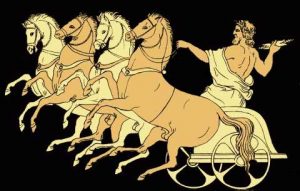
The Greeks are then addressed by Odysseus and Nestor, and Agamemnon concludes the debate by a call to immediate battle. But first the troops are well fed, whilst Agamemnon gives a banquet to six of the chieftains, at which Menelaus is present. The king stands by the burntoffering, to which no omen is vouchsafed. Nevertheless, the army is set in array, and a long battle follows between the Greek on the one side, and of the Trojans and their allies on the other.
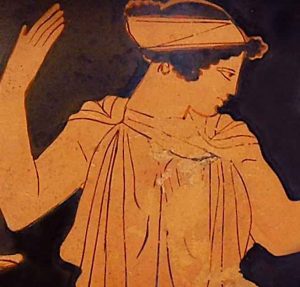
Agamemnon fears his brother is mortally injured. Machaon, however, heals the wound, and the Greek leaders being roused to avenge the treachery, their forces are gathered, and Nestor counsels the positions of the lines of the battle, the plan of which is followed to the present day.
Again the two armies encounter each other, like two winter torrents mingling in a deep ravine. Then follows a series of single combats between warriors of note on either side, Athena cheering on the Greeks, and Apollo the Trojans. The gallant Diomedes is hit by Pandarus, but the goddess heals the wound, and, returning to the contest, he kills his foe, and crushes the hipjoint of Aeneas, who is screened from further harm by Aphrodite.
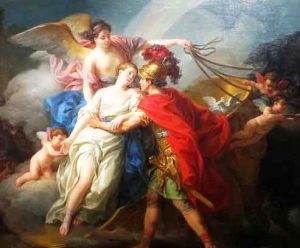
The queen of the gods in form of Stentor of the brazen voice, reproaches the Greeks with cowardice, whilst Athena, taunting Diomedes with his inferiority to his father Tydeus, who, though small in stature, was every inch a soldier, mounts his chariot against Mars, and the gods ichor being made to flow from a wound inflicted by Diomedes spear, he cries out with a shout like ten thousand men, and flies to Zeus who rates him soundly, but bids Poeon heal Mm, and Hebe prepares him a bath. The fight continues, and Diomedes encounters Glaucus, who, in answer to his inquiry, replies, Brave son of Tydeus.
Glaucus, however, proceeds to announce himself as the grandson of Bellerophon, who rode Pegasus, and slew Chimmera, and Diomed remembers that his grandfather was Bellerophons guest. So, instead of fighting, they exchange armour in token of amity. The Trojans being hard pressed, Hector sends his mother, Hecuba, to offer prayers to Athena and finding Paris in the palace with Helen, upbraids him sharply.
The fight continues, and Diomedes encounters Glaucus, who, in answer to his inquiry about who is he , replies, that he is the brave son of Tydeus.
Glaucus, however, proceeds to announce himself as the grandson of Bellerophon, who rode Pegasus, and slew Chimera, and Diomedes remembers that his grandfather was Bellerophons guest. So, instead of fighting, they exchange armour in token of amity.
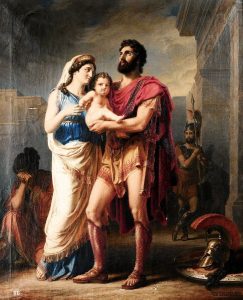
Next morning the battle is renewed, and the Greeks are very hard pressed. Achilles sends Patroclus to learn how they are doing, and Nestor begs him to persuade his master to come to the rescue. The Trojans charge the entrenchments, whilst an eagle drops a serpent in the midst of the combatants.
Hector makes the portent, saying, that thos is a good omen for our countrys cause but the balance of the fight hangs even, until he heaves a huge boulder, which bursts open the wooden gates of the Greek stockade, and as the Trojans rush in the Greeks flee in confusion to their ships.
Neptune, however, in the form of the soothsayer Calchas, rallies them, and Hector’s advance is checked. But the Greek ships are still in danger of being burnt, and a proposal to launch them and escape during the night is with difficulty over-ruled.
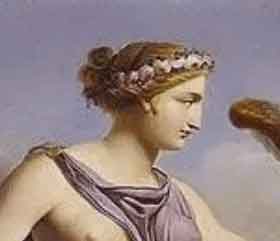
Zeus awakes in time to avert further danger from the Trojans, and, turning wrathfully on Hera, reminds her how he has punished her in former times, and explains his desire to teach the Greeks their utter helplessness without Achilles. For this purpose, Apollo is sent to revive Hector and accompany him back to the conflict.
Flashing his shield in the faces of their adversaries, he clears a way for the Trojan chariots. The struggle is renewed, and, as Hector attacks the galley in which Ajax stands at bay with an enormous pike, Teucer plies his arrows, and twelve Trojans are slain in their attempts to set the Greek ships on fire.
Achilles, who has been watching the peril of his countrymen, now consents that Patroclus shall go, clad in his armour, at the head of the Myrmidons, to aid them. The Trojans, believing it is Achilles himself who is leading, retreat in dismay, and Sarpedon, Jupiters son, is slain.
But Patroclus ventures too far in pursuit Apollo meets and disarms him, Euphorbus stabs him from behind, and Hector drives his spear through his body. With his dying breath he foretells the fate of his slayer, and the Greeks succeed in carrying off his body, Zeus casting a veil of darkness around it.
The crisis of the story is now reached. Achilles is frantic with grief and rage at the death of his comrade, and eager to avenge him. His mother, Thetis, reminds him that when Hector falls his own last hour is near, but he replies, “Be it so, death comes in turn to all”. He cannot, however, go forth without armour, and his mother promises that Hephaestus shall forge him a suit by to-morrows dawn.
Meanwhile, Iris bids him let the Trojans hear his voice, and, standing on the rampart, under the shield of Athens, he shouts thrice aloud. They are seized with panic and abandon their pursuit of the Greeks, who bear off the corpse of Patroclus to Achilles tent.
Hephaestus is making velocipedes and automaton helpers when Thetis applies to him, but he willingly accedes to her request on behalf of her son. The helmet and breast-plate and body gear are soon ready, but upon the shield he bestows his utmost skill, and the poets description of it is so graphic and elaborate that it will not bear condensing.
Thus armed for the deadly fight, Achilles makes for the tent of Agamemnon, calling on the Greek leaders to make ready as he passes the galleys and he and the king, mutually admitting themselves to blame, are reconciled. Odysseus urges the need of a substantial meal for the army, from which Achilles sits apart, but is sustained by Athena with ambrosia and nectar. When all is prepared for the battle he mounts his chariot, drawn by Xanthus and Balius, and bearing the ashen spear of Mount Pelion, the gift of the Centaur.
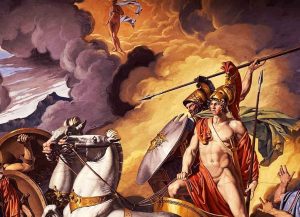
As Achilles draws near him, the Trojan hero’s courage wholly deserts him, and thrice he flies, with his adversary in pursuit. Then his guardian, Apollo, leaves him, and Athena comes to the aid of her favourite. Hector now turns and challenges his foe, at the same time endeavouring to make a mutual agreement that the dead body of whoever of them is slain should be returned to his family, but Achilles rejects the proposal, and makes the first thrust.
Hector rushes on him and falls mortally wounded by Achilles spear, beseeching that his father Priam may be allowed to ransom his corpse, and prophesying the death of his adversary when he obdurately refuses his prayer.
Savagely, instead, Achilles fastens the body to his chariot, and drags it towards the Greek fleet, in sight of Priam and Andromache.
On reaching the ships he flings the corpse in the dust in front of Patrocluss bier and, whilst he sleeps after his exertions, the shade of his friend appears to chide him for leaving his body so long unburied.
Next day the funeral pile is built, and the burial rites are celebrated, twelve captive Trojan youths being slaughtered by Achilles himself, and their bodies added to the flaming heap with the other libations. Then followed the funeral games, consisting of chariot races, boxing matches, wrestling, foot races, a single combat with shield and spear, archery, and hurling the spear.
But the wrath and grief of Achilles are not yet appeased, and for twelve days he drags the body of Hector each morning three times round the tomb containing the ashes of Patroclus. At last Priam is led by Hermes to his tent, and the aged monarch, in an agony of supplication, succeeds in obtaining from him the corpse, which, after it has been washed and anointed, and clothed in costly raiment by Achilles orders, he carries back to Troy. The poem then concludes with a description of Hectors funeral rites, for the due celebration of which Achilles has spontaneously offered a twelve days truce .
Eventually, the Greek hero Odysseus leads the Greeks to victory, inventing the clever trick so that the Greek soldiers secretly entering Troy inside the Trojan Horse, an operation he headed himself. Troy was looted and of the most important Trojan heroes, only Aeneas survived, who along with a group of Trojan refugees crossed the Mediterranean to Italy to establish what eventually became Rome.
